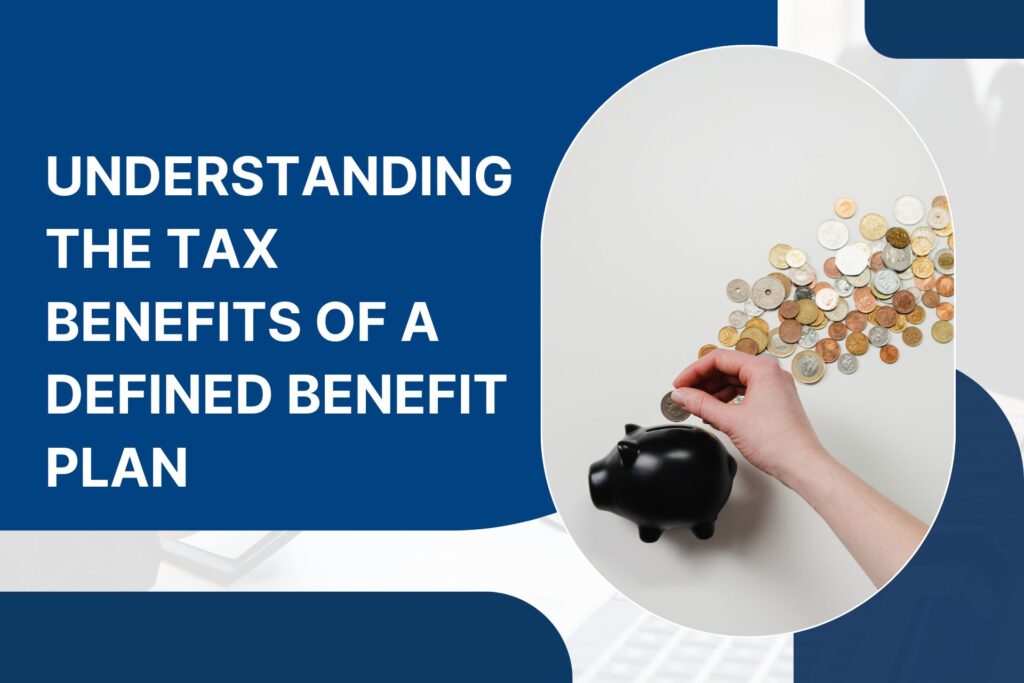Defined Benefit Plans are a cornerstone of retirement planning, offering employees a predictable and secure retirement income. Unlike Defined Contribution Plans, where the retirement benefit depends on investment returns, Defined Benefit Plans promise a specified monthly benefit at retirement. This promise provides a significant sense of financial security for employees. However, one of the most compelling advantages of Defined Benefit Plans lies in their tax benefits. In this comprehensive article, we will explore the various tax benefits of Defined Benefit Plans associated and how they can enhance your financial planning strategy.
Calculate your Retirement Plans Today!
Calculate Now!Tax Benefits of a Defined Benefit Plan
Employer Tax Deductions
One of the most substantial tax benefits of Defined Benefit Plans is the potential for significant employer tax deductions. Contributions made by employers to fund Defined Benefit Plans are typically tax-deductible. This means that the amount contributed to the plan can be deducted from the employer’s taxable income, reducing the overall tax liability. This can be particularly advantageous for small business owners and companies with high marginal tax rates, as it allows them to redirect funds that would otherwise be paid in taxes into the retirement savings of their employees.
Tax-Deferred Growth
Another critical tax advantage of Defined Benefit Plans is the tax-deferred growth of plan assets. The funds contributed to the plan grow on a tax-deferred basis, meaning that they are not subject to income tax until they are distributed to retirees. This allows the investments within the plan to compound more rapidly, as the returns on these investments are not diminished by annual taxes. Over time, this tax-deferred growth can significantly increase the total value of the retirement benefits provided by the plan.
Employee Tax Benefits
Employees also enjoy considerable tax benefits from participation in Defined Benefit Plans. Firstly, the contributions made by the employer on behalf of the employees are not considered taxable income for the employees at the time the contributions are made. This means that employees do not have to pay income tax on the amounts contributed to the plan, allowing them to benefit from the full value of the contributions. Additionally, the retirement benefits received from the plan are typically taxed as ordinary income when they are distributed. However, because retirees often fall into a lower tax bracket than during their working years, the overall tax burden on these distributions may be significantly lower.
Tax Credits for Small Employers
To encourage the establishment and maintenance of retirement plans, the government offers tax credits to small employers who set up Defined Benefit Plans. The Retirement Plans Startup Costs Tax Credit allows eligible small businesses to claim a credit for up to 50% of the costs associated with starting a retirement plan, including Defined Benefit Plans. This credit can be claimed for three years and is capped at $5,000 per year. This incentive can substantially offset the initial costs of setting up a Defined Benefit Plan, making it more accessible for small employers.
Reduced Taxable Estate
For business owners, establishing a Defined Benefit Plan can also have estate planning benefits. Contributions to the plan reduce the taxable estate of the business owner, as the funds are no longer part of their personal assets. This can be particularly advantageous in reducing estate taxes upon the owner’s death. By funding a Defined Benefit Plan, business owners can ensure that a larger portion of their wealth is preserved for their beneficiaries rather than being diminished by estate taxes.
Advantages for High-Income Earners
For business owners, establishing a Defined Benefit Plan can also have estate planning benefits. Contributions to the plan reduce the taxable estate of the business owner, as the funds are no longer part of their personal assets. This can be particularly advantageous in reducing estate taxes upon the owner’s death. By funding a Defined Benefit Plan, business owners can ensure that a larger portion of their wealth is preserved for their beneficiaries rather than being diminished by estate taxes.
Compliance with Tax Regulations
Defined Benefit Plans must comply with specific tax regulations to maintain their tax-advantaged status. This includes meeting minimum funding standards, adhering to contribution limits, and ensuring nondiscrimination in favor of highly compensated employees. Employers must work closely with plan administrators and tax advisors to ensure compliance with these regulations. Proper compliance not only preserves the tax benefits of the plan but also avoids potential penalties and fines associated with non-compliance.
Conclusion
Defined Benefit Plans offer numerous tax advantages that can significantly enhance both employer and employee financial outcomes. From employer tax deductions and tax-deferred growth to employee tax benefits and small business tax credits, these plans provide a robust framework for tax-efficient retirement savings. High-income earners and business owners can particularly benefit from the high contribution limits and estate planning advantages. However, to fully capitalize on these benefits, it is crucial to maintain compliance with all relevant tax regulations.
SHARE THIS POST
Generation X and Retirement
Generation X and Retirement: Discover smart strategies to avoid costly mistakes and secure your future with effective financial planning.
Defined Benefit Plan vs 401k: Best Pension Plans for Small Business Owners
Discover the key differences between a Defined Benefit Plan vs 401k, and find the best pension plan for small business owners.
Retirement in USA
Planning for retirement in USA involves Social Security, inflation strategies, and choosing the best states, ensuring a secure financial future.
Best Strategies to Maximize Your 401k
Learn effective strategies to maximize your 401k for a secure retirement. Discover tips on matching, investment choices, and catch-up contributions!


